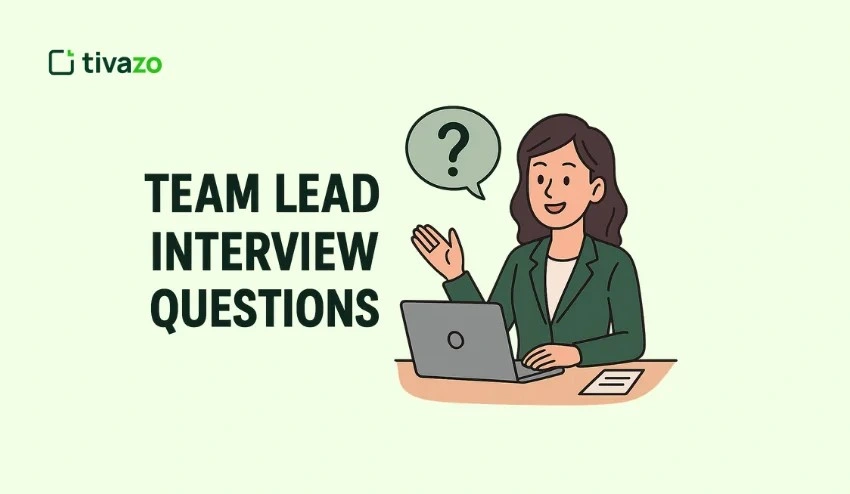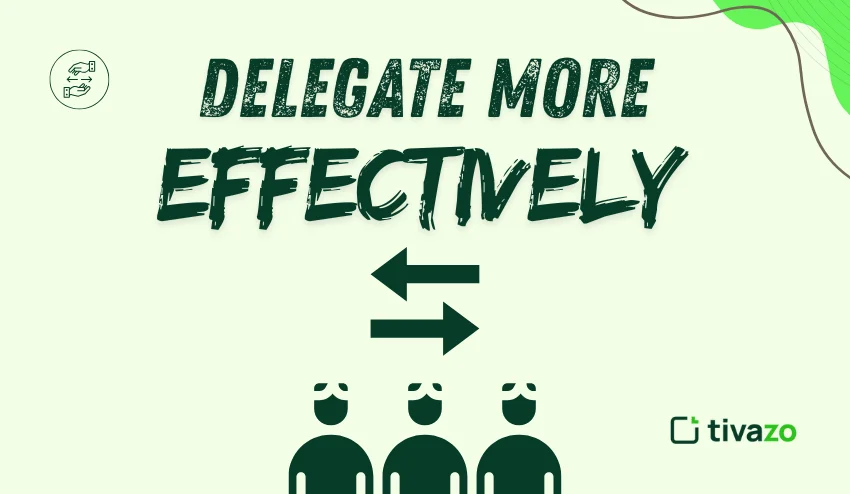Whether you’re getting ready for your next big job interview or deciding to hire your next star employee, knowing the right team leader interview questions can be the difference between success and failure. Today, hiring companies are seeking candidates who are well-rounded individuals with not only strong leadership skills, but also the ability to adapt, communicate, and get results. That’s why both hiring managers and candidates need to identify the most meaningful and relevant team leader interview questions-and how to answer them.
In this guide, we’ll cover the most commonly asked team leader interview questions, example answers, important team leader responsibilities, and the key characteristics every team leader must possess. If you aim to crush the interview process or build a great team, this blog has you covered.
Key Highlights:
- What Are Common Interview Questions for Team Leaders?
- What Are 5 Typical Responsibilities of a Team Leader?
- Which Three Qualities Must a Team Leader Have?
- Why Should I Employ You as a Team Leader?
- What Should a Team Leader Say in an Interview?
- 4 Things interviewers want to know
What Are Common Interview Questions for Team Leaders?
Hiring managers often use a combination of general, situational, and behavioral team-leader interview questions, along with in-depth questions in their depth.
General Questions (Introductory)
- Tell me about yourself.
- What appeals to you about this role/organization?
- What do you know about the organization?
- What are your strengths and areas for improved development?
Experience & Background
- What size teams have you managed?
- What type of a leader are you?
- How do you deal with conflict?
- How do you assess productivity at the team level?
In-Depth & Behavioral
- How would you manage underperformance?
- How do you manage stress or remote teams?
- Tell me about a project that was unsuccessful and how you moved forward.
Scenario-based (Situational)
- The five key team leader interview questions that are scenario-based include conflict, sudden departure, new hire integration, pressure for deadlines, and balancing workloads.
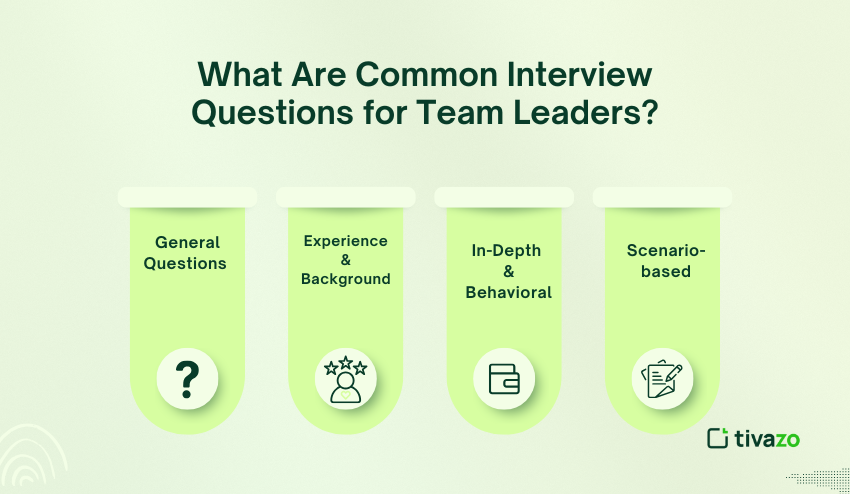
What Are 5 Typical Responsibilities of a Team Leader?
Team Leaders have been positioned as the go-between for management and the team. Team Leaders are often expected to balance several responsibilities that contribute to both the performance of the team and the growth of the organization. When preparing for interview questions for team leader positions, expect to be asked about how you managed these responsibilities in real life.
Here are five typical responsibilities with descriptions of each:
| Responsibility | Description |
| Goal setting & results | Setting specific goals, measuring performance against goals, and motivating the team to achieve goals. |
| Task allocation & productivity | Allocating roles that exploit the strengths and capabilities of individuals while ensuring tasks are completed efficiently and on time |
| Dispute resolution & communication | Resolving differences productively and maintaining communication channels. |
| Feedback & growth | Providing coaching regularly to find opportunities for development & creating competency. |
| Motivation & team morale | Utilising recognition, support, and a positive team environment to promote engagement. |
Which Three Qualities Must a Team Leader Have?
Technical skills and work experience are indeed important, but truly great leaders possess three essential personal qualities. These qualities will not only affect how well a team performs, but they will also be an important aspect for candidates during the candidate exams, which require answers for team leader interview questions. Employers want to know whether candidates can manage people effectively, whether candidates can adapt to challenges, and whether they will focus on a team’s long-term performance.
Here are three qualities every team leader must have:
1. Communication & Emotional Intelligence
All great leaders are good communicators. They listen actively, provide clear instructions, and encourage their team to ask questions. Because every team situation has its dynamics, leaders with high emotional intelligence will not only acknowledge team dynamics; these leaders are able to empathize with the needs of their team members and also address issues that could become tense if not resolved immediately. In team leader interview questions, expect to be asked how you might have used clear communication or emotional awareness in order to improve performance or to resolve conflict.
2. Organizational & Delegation Skills
Successful team leaders are more inclined to plan, know what should have priority, and assign roles according to the umpteen members’ strengths. Interviewers become informed about you when asking related team leader interview questions on time management and delegation to measure your ability to drive productivity with a fair and efficient distribution of work among the team.
3. Integrity, Accountability & Coach-Style Leadership
Leadership is built on a foundation of trust. Employers want to have leaders who lead by example, take ownership of their choices, and motivate others to develop. Coach-style leaders do not micromanage—they empower. Most behavioral-style team leader interview questions will ask you how you’ve responded to adversity, established trust, or assisted a teammate who was struggling. Authenticity and ethics go a long way in creating a lasting impression.
Incorporating these three characteristics—along with real examples—will prepare you to take on even the most difficult team leader interview questions with confidence.
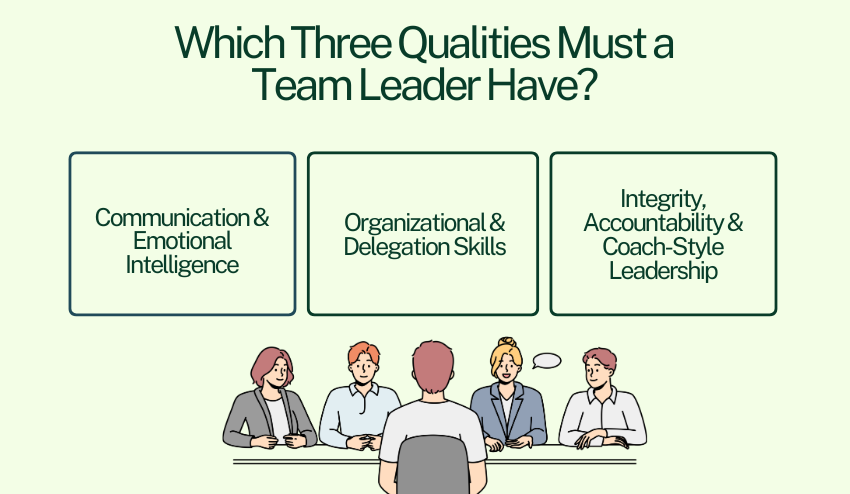
Candidates being assessed for leadership experience and skills are expected to take on these core responsibilities with confidence. Many team leader interview questions focus on how you set goals, delegate tasks, resolve problems, and keep your team motivated. That’s why interviewers will want examples of leadership based on experience, rather than a mere description of what you know about leading. Your answers will best be served using stories to demonstrate your leadership experience in the challenging times, as well as how you develop talent and lead to measurable results. Generally, these five responsibilities capture the essence of what most employers will consider successful team leaders.
Why Should I Employ You as a Team Leader?
This is one of the most universal and essential team leader interview questions. It allows you to concisely express your leadership value and alignment with the company’s needs, and demonstrate why you are the best fit. Use a methodical, point-form approach like below to make a compelling long-term impression:
1. Address the Core Responsibilities
Hiring managers want to know your practical ability to carry out the daily realities of a leadership job. Customize your answer by addressing the five core responsibilities:
- Goal-setting: “I set clear, measurable team goals and track continual progress towards meeting those goals by using key performance indicators.”
- Task delegation: “I delegate tasks based on team member strengths to be both effective and allow for team member growth.”
- Conflict resolution: “I proactively navigate team dynamics and take the lead to resolve conflicts in honest and open communication.”
- Motivation: “I motivate my team using recognition, transparency, and growth opportunities.”
These are the real-life leadership abilities that employers want to surface using team leader interview questions!
2. Discuss your leadership style
Interviewers want to know how you lead – not just what you do. Pick a leadership style that matches their team culture.
Example:
“I lead by coaching and collaboratively. I like to empower my team members through feedback, by providing ownership, and tracking small wins. Our trust and morale build up, even in stressful or high-pressure situations.”
If your leadership style is adaptive, transformational, or servant leadership, describe it in simple language and support it with examples. This style-based approach is unique in questions related to team leader interview questions, as it displays your personality as a leader.
3. Show Proven Results
Don’t just say, “show impact.” Provide measurable metrics or outcomes to support your show of leadership success.
Example:
“As a direct result of my leadership, we improved our team’s efficiency by 15% in three months. I did this through a cross-training program that allowed teammates to build morale and minimize bottlenecks in task performance.
Bonus tip: Write out 2–3 of these impact stories before the interview. Many team leader interview questions assessed leadership experience, and when measuring that, they will connect past success to previous performance rather than finding unexplored success to continue forward.
You’re going to cover all angles by addressing the responsibilities, leadership style, and measurable results. This will empower you to construct a confident, tailored response to the “Why should we hire you?” question. It is one of the most critical team leader interview questions. Ensure your answer is specific, concise, and memorable.
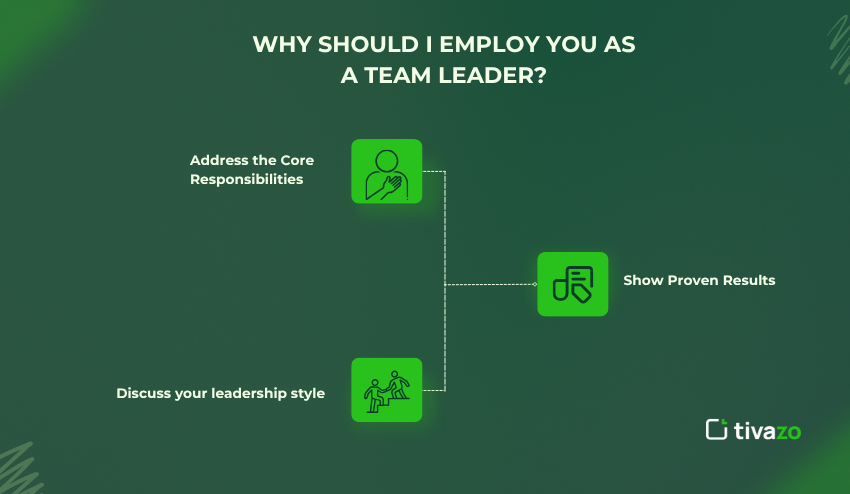
What Should a Team Leader Say in an Interview?
When preparing for the team leader interview questions, one of the hardest parts is knowing not only what to say, but how to say it. Interviewers and potential employees are evaluating how well you communicate, your leadership style, and your level of self-awareness. What you say decides if you are fit to lead, problem-solve, and inspire teams.
Here are seven messages that your team leader interview should discuss.
1. You our knowledgeable about the company and role
Leading off, demonstrate that you have done some research. Talk positively and with confidence about the company’s values, objectives, and pressures. Then demonstrate how your leadership style fits with the company’s mission.
STAR Example:
Situation: At a new company with a strong innovation mindset.
Task: Immerse yourself in the culture while adding value.
Action: Read and learn as much as possible about the company values and goals, and reach out to team leads early to build confidence and rapport.
Result: Developed rapport and completed a process improvement in the first 30 days.
2. You have a Positive Energetic Attitude
Creativity, innovation, and productivity require energy. Make sure to communicate with a general tone, language, and vocal patterns that are positive, confident, and purposeful.
“Even when I am working with urgent projects and under significant pressure, I still maintain a calm, positive, and future-focused attitude. I use this approach to help the team keep looking for solutions instead of feeling stressed.”
3. What Should a Team Leader Say in an Interview?
One of the most critical parts of preparing for team leader interview questions is knowing not just what to say – but how to say it. Interviewers carefully consider how well you present your ideas, engage in discussion, your communication skills, leadership strengths, and self-awareness. What you present demonstrates your level of readiness to manage and lead people, work through issues, and inspire the collective interests of the teams you manage.
4. You Think Strategically and Adapt Well to Change
Share how you’ve responded to change, whether due to new tools, shifting business priorities, or sudden obstacles.
“When our project management platform was replaced, I quickly trained my team, created templates, and ensured zero productivity loss during transition.”
5. You Are Engaged and Have the Right Attitude
Tell the interviewers you are passionate about leadership and committed to your learning. A leader has to be adaptable and open to learning something new.
“I like to take leadership workshops and surveys all the time. Being open to learning and honest feedback is not an option. It is required if I want to lead.”
6. You Communicate Directly and Are an Active Listener
Leaders need to listen, and their team members need to feel heard. Don’t forget to convey that you allow their teams to be open and honest with feedback.
“Every time I do a check-in, once a week, I always ask two questions: What is going well? And what can we do better? By asking these questions, I create space for collaborative learning and improvement.”
7. When You Drive Leadership,
You Drive Meaningful Outcomes Bullet Always relate your leadership to outcomes: whatever they are: retention, efficiency, performance metrics, and/or team morale.
STAR Example
Situation: After a dismal product launch, team morale was at an all-time low.
Task: My task was to instill trust again and drive product launch results.
Action: I conducted open and honest forums, encouraged team members to take ownership, and introduced a rewards program for participants.
Result: I reversed team performance and trust in less than two months and achieved all (and more) of my product launch targets.
4 Things interviewers want to know
- Your leadership style and flexibility.
- Your ability to manage conflict & stress.
- Your methods for motivation & feedback.
- Your decision‑making & delegation style.
Your results and growth mindset (i.e., how do you help the team grow and be successful).
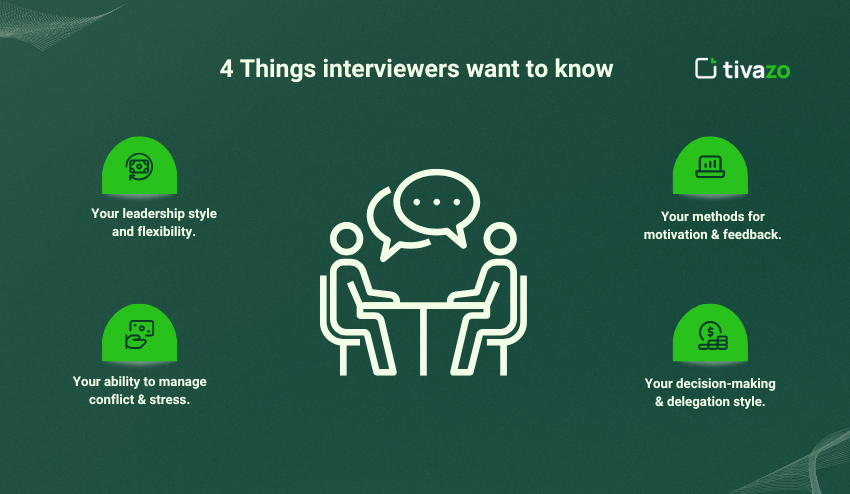
Conclusion
Whether you are pursuing a team leader interview questions and preparing for an interview or hiring one, mastering the responses to team leader interview questions is paramount. Now that you have an understanding of the most frequently asked questions and the five primary duties, and the three important characteristics of a team leader, you also have the knowledge and skills to be successful.
As we have covered in this guide, answering team leader interview questions with clarity, confidence, and applicable examples using the STAR method can go a long way in making a great impression. Remember, the interview does not simply focus on what you said, but how you articulated your responses to assess your attitude, team leader style, and ability to advance team success.
Whether you are illustrating your experience or building a team that fits and performs at a high level, your understanding of the framework around team leader interview questions is one way to distinguish yourself in today’s flexible workforce.
Now, it’s your turn. Prep your stories, reflect on your leadership experiences, and prepare for your team leader interview questions.

